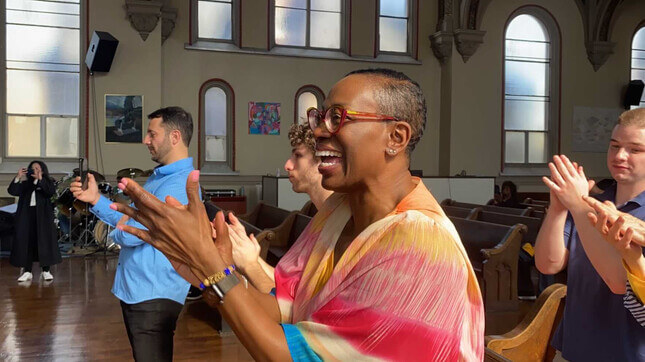Nina Turner Doesn’t Need the Establishment
The progressive House candidate faces a tough battle in Ohio. But she's got fervent grassroots support on her side...and, of course, Marianne Williamson.
In DepthIn Depth
Photo: Nina Turner for Congress
On an unseasonably balmy April afternoon in Cleveland, a near-biblical scene is playing out before the pulpit inside of the Holy Trinity Cultural Arts Center. Brazen progressive House candidate Nina Turner, who once likened then-presidential candidate Joe Biden to a “bowl of shit,” stands at the center of a congregation of her supporters, their arms stretched skyward, eyes closed in prayer. The assemblage looks like a human shield—the impenetrable membrane to Turner’s nucleus.
“God, we pray for her strength,” Pastor Dr. Andrew Clark Jr. offers over a symphony of spontaneous shouts of affirmation and impassioned piano-playing. Turner, illuminated by iridescent rays of midday sun streaming though the stained glass, removes her glasses and holds a singular clenched fist just above her head. Moving closer and closer to Turner—eyes closed and arms raised with the rest, as if compelled by the Holy Spirit itself—is none other than former presidential candidate Marianne Williamson.
Williamson has flown to Ohio from Washington, D.C., to lend her support to Turner in the grueling Democratic primary race for Ohio’s 11th district, where the famous firebrand is trying to to unseat moderate incumbent Rep. Shontel Brown (D). And frankly, the former state senator and co-chair of Bernie Sanders’ presidential campaign needs friends right now; the gathering in the church falls smack dab in the middle of a very arduous moment for Turner. Just weeks earlier, The Intercept reported that crypto tycoon Sam Bankman-Fried has spent over a million dollars to back Brown via super PAC, Protect Our Future, and billionaire oil heiress Stacy Schusterman gave $2 million to Democratic Majority for Israel (DMFI) PAC, which went directly to television ads for Brown. Then, in a move that felt personally upsetting for Turner, the Congressional Progressive Caucus PAC and Rep. Pramila Jayapal (D-Wash.)—whom were expected to endorse her—backed Brown instead. While these moments have hardly sealed Turner’s fate, they’ve undoubtedly made what was already an uphill battle a much steeper climb.
“It was disappointing and surprising,” Turner told me of the caucus’s decision, as she snuck in a hurried meal before driving herself to the church. As of late, driving herself to her own events has become a habit for Turner, much to the chagrin of her team. “I’m not just some typical politician or former elected running for office,” she said. “I’m an activist leader in this movement, and I’ve been on the battlefield for Medicare for All, for example, with many of those members that are in the caucus. I’m their colleague, even if I’m not serving in elected office.”
Turner isn’t exactly popular in the Democratic Establishment lately. And Williamson, at least, is still standing by her amid the betrayal, having found herself “mesmerized” by the former state senator when they first met at a 2014 fundraiser at the home of Los Angeles attorney Lisa Bloom—otherwise known as Gloria Allred’s daughter and former attorney for Hollywood’s most notorious sexual predator, Harvey Weinstein, though none of that news had surfaced yet. “It’s kind of like when, it sounds silly, but there are those moments in culture, like when Madonna first came out with the ‘Borderline’ video, and you just look at that and go, ‘That’s a star,’” Williamson told me on the rooftop of a cocktail bar in Shaker Heights, lush with hunter green velvet couches and veiny plants. “There are moments like that in culture, and there are moments like that in politics.”

“As she has become more and more of a significant figure on the political landscape, I haven’t failed to notice that she hasn’t changed her principles,” Williamson continued. “And I’m sure she’s had enough opportunity to do just that, so I have tremendous respect and personal affection for her the more I get to know her.”
It’s an unexpected allyship, perhaps, but one that could actually help keep Turner in the running against a well-funded incumbent who won’t be easy to oust.
True progressives—or “freedom fighting progressives,” as Turner coins them—are often dismissed by the mainstream Democrats as prophet-on-the-hill types, teeming with lofty (read: unrealistic) ideas and flocks of disciples who hope against hope that they’ll be brought to fruition. Turner’s speeches have been routinely deemed “sermonlike;” similarly, as former Sanders aide Ari-Rabin-Havt just detailed in his new book, The Fighting Soul: On The Road With Bernie Sanders, former President Barack Obama once likened Sanders to an Old Testament prophet in a closed-door meeting.
-

-

-

-

-

-

-

-

-

-

-

-

-

-

-

-

-

-

-

-

-

-

-

-

-

-

-

-

-

-

-

-

-

-

-

-

-

-

-

-








































